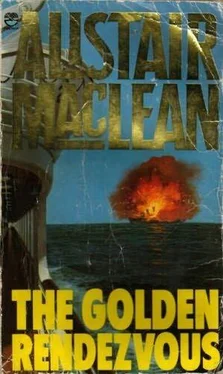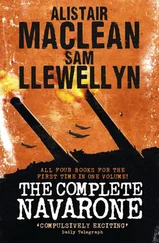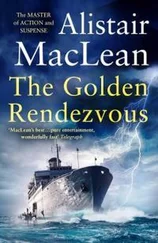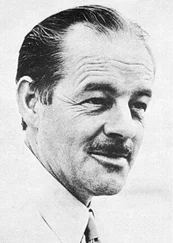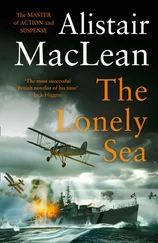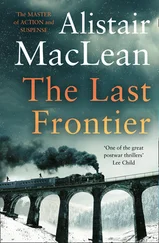“Well, John, you may be right,” old Marston said weightily. He was suddenly looking five years younger. “You may indeed be right. But my sense of duty…”
“It does you great credit, doctor. But think of all those people who have been carrying a bullet about inside their chests since the first world war and still going strong.”
“There’s that, of course, there’s that.” I had rarely seen a man looking so relieved. “We’ll give nature a chance, hey?”
“Captain Bullen’s as strong as a horse.” The old man had at least a fighting chance now; I felt as if I’d just saved a life.
I said weakly, “You were right, doctor. I’m afraid I have been talking too much. Could I have some water, please?”
“Of course, my boy, of course.” He brought some, watched me drink it, and said, “that feel better?” “Thank you.” My voice was very faint. I moved my lips several times, as if speaking, but no words came. Marston, alarmed, put his ear close to my mouth to make out what I was trying to say, and I murmured, slowly and distinctly, “My thighbone is not broken, but pretend it is.”
He started, eyes reflecting astonishment, opened his mouth to speak, and then closed it again. He wasn’t all that slow, the old boy. He nodded slightly and said, “Ready for me to begin?”
He began. Susan Beresford helped him. My leg was a gory sight but looked worse than it was. One bullet had passed directly through the leg, but the other two had just torn superficial gashes on the inside, and it was from those that most of the blood had come. All the while he was working Dr. Marston kept up, for the sake of the guard, a running commentary on the extent and severity of my wounds, and if I hadn’t known he was lying fluently he would have made me feel very ill indeed. He certainly must have convinced the guard. When he’d cleaned and bound the wounds, a process I bore with stoic fortitude only because I didn’t want to start yelling in front of Susan Beresford, he fixed some splints to my leg and bound those on also. This done, he propped up my leg on a pile of pillows, went into the dispensary and reappeared with a couple of screwed pulleys, a length of wire with a heavy weight attached to the end, and a leather strap. The strap he fitted to my left ankle.
“What’s this in aid of?” I demanded.
“I’m the medical officer, please remember,” He said curtly. His left eyelid dropped in a slow wink. “Traction, Mr. Carter. You don’t want your left leg to be permanently shortened for life?”
“Sorry,” I muttered. Maybe I had been misjudging old Marston, just a little. Nothing would ever make me reconsider my opinion of him as a doctor, but he was shrewd enough in other things: the first thing a man like Carreras would have asked was why a man with a broken bone in his thigh was not in traction. Marston screwed the two hooks into holes in the deckhead, passed the wire through, attached the weight to one end and the strap to the other. It didn’t feel too uncomfortable. He then picked up the length of trouser leg that had been cut off, checked quickly to see if the guard was watching, splashed some water on it, and then wrung it out on top of my bandages. Even to myself I had to admit that I’d seldom seen a more convincing sight, a patient more completely and thoroughly immobilised.
He finished just in time. He and Susan Beresford were just clearing away when the door opened and Tony Carreras came in. He looked at Bullen, Macdonald, and myself, slowly, consideringly he wasn’t a man who would miss very much — then came to my bedside.
“Good evening, Carter,” he said pleasantly. “How are you feeling?”
“Where’s that murderous parent of yours?” I asked.
“Murderous parent? You do my father an injustice. Asleep, at the moment, as it happens: his hand was giving him great pain after Marston had finished with it” — I wasn’t surprised at that.” So he was given a sleeping draught. The good ship Campari is all buttoned up for the night and captain Tony Carreras in charge. You may all sleep easy. You’ll be interested to hear that we’ve just picked up Nassau on the radarscope — port forty, or some such nautical term — so you weren’t playing any funny tricks with that course after all.”
I grunted and turned my head away. Carreras walked across to Marston. “How are they, doctor?”
“How do you expect them to be after your thugs have riddled them with bullets?” Marston demanded bitterly. “Captain Bullen may live or die, I don’t know. Macdonald, the bo’sun, will live, but he’ll be a stiff-legged cripple for life. The chief officer has a compound fracture of the femur — the thighbone. Completely shattered. If we don’t get him to hospital in a couple of days, he also will be crippled for life; as it is, he’ll never be able to walk properly again.”
“I am genuinely sorry,” Tony Carreras said. He actually sounded as if he meant it. “Killing and crippling good men is an unforgivable waste. Well, almost unforgivable. Some things justify it.”
“Your humanity does you credit,” I sneered from my pillow.
“We are humane men,” he said.
“You’ve proved that all right.” I twisted to look at him. “But you could still show a little consideration for a very sick man.”
“Indeed?” He was very good at lifting eyebrows. “Indeed. Dan’l boone, here.”
I nodded towards the sentry with the gun. “You permit your men to smoke on duty?”
“Jose?” He smiled. Jose is an inveterate chain smoker. Take his cigarettes away and he’d probably go on strike. This isn’t the grenadier uards, you know, Carter. Why the sudden concern?”
“You heard what Dr. Marston said. Captain Bullen. He’s in a critical condition with a hole through his lung.”
“Ah, I think I understand. You agree, doctor?”
I held my breath. The chances were that the old boy hadn’t even the faintest idea what we were talking about. But again I’d underrated ills astuteness.
“For a man with a ruptured lung,” he said gravely, “there can be nothing worse than a smoke-laden atmosphere.”
“I see. Jose!” Carreras spoke rapidly in Spanish to the guard, who grinned amiably, got to his feet, and made for the door, picking up a chair en route. The door swung to behind him.
“No discipline.” Tony Carreras sighed. “None of this brisk sentry-go marching and countermarching like Buckingham palace, Mr. Carter. A chair tilted against a wall. Our Latin blood, I fear. But, I warn you, nonetheless effective a guard for all that. I see no harm in his keeping a watch outside; apart from jumping out through one of the windows into the sea below not that you are in any condition to do that anyway can’t see what mischief you can get up to.” He paused, looked at me consideringly. “You are singularly incurious, Mr. Carter. Far from being in character. Makes one suspicious, you know.”
“Curious about what?” I growled. “Nothing to be curious about. How many of those armed thugs do you have aboard the Campari?”
“Forty. Not bad, eh? Well, thirty-eight effectives. Captain Bullen killed one and you seriously damaged the hand of another. Where did you learn to shoot like that, Carter?”
“Luck. Cerdan recovered yet?”
“Yes,” he said briefly. He didn’t seem to want to talk about Cerdan.
“He killed Dexter?” I persisted.
“No. Werner, the nurse — the one you killed to-night.” For a professed humanitarian, the death of one of his colleagues in crime left him strangely unmoved. “A steward’s uniform and a tray of food at face level. Your head steward, White, saw him twice and never suspected, not that he went within thirty feet of White. And it was just Dexter’s luck that he saw this steward unlocking the radio room.”
Читать дальше
Конец ознакомительного отрывка
Купить книгу
